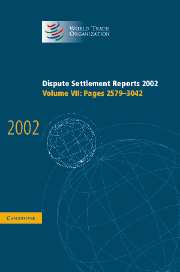United States- Section 129(c)(1) of the Uruguay Round Agreements Act (WT/DS221): Report of the Panel
Published online by Cambridge University Press: 13 December 2017
Summary
PROCEDURAL BACKGROUND
On 17 January 2001 Canada requested consultations with the United States pursuant to Article 4 of the Understanding on Rules and Procedures Governing the Settlement of Disputes (hereafter the “DSU”), Article XXII of the General Agreement on Tariffs and Trade 1994 (hereafter the “GATT 1994”), Article 30 of the Agreement on Subsidies and Countervailing Measures (hereafter the “SCM Agreement”) and Article 17 of the Agreement on Implementation of Article VI of the General Agreement on Tariffs and Trade 1994 (hereafter the “AD Agreement”) regarding section 129(c)(1) of the US Uruguay Round Agreements Act (hereafter the “URAA”) and the Statement of Administrative Action (hereafter the “SAA”) accompanying the URAA.
Consultations were held in Washington, D.C., on 1 March 2001, but did not lead to a mutually satisfactory resolution of the matter.
On 24 July 2001, Canada requested the Dispute Settlement Body (hereafter the “DSB”) to establish a panel pursuant to Articles 4 and 6 of the DSU, Article XXIII of the the GATT 1994, Article 30 of the SCM Agreement and Article 17 of the AD Agreement. Canada's panel request referenced only section 129(c)(1) of the URAA as the measure at issue. Canada claimed that section 129(c)(1) of the URAA is inconsistent with Articles VI:2, VI:3 and VI:6(a) of the the GATT 1994; Articles 10, 19.4, 21.1, 32.1 and 32.5 of the SCM Agreement; Articles 1, 9.3, 11.1, 18.1 and 18.4 of the AD Agreement; Article XVI:4 of the Marrakesh Agreement Establishing the World Trade Organization (hereafter the “WTO Agreement”); and Articles 3.2, 3.7, 19.1, 21.1 and 21.3 of the DSU.
At its meeting on 23 August 2001, the DSB established a panel pursuant to the request of Canada, in accordance with Article 6 of the DSU. The panel was established with standard terms of reference. The terms of reference are the following:
To examine, in the light of the relevant provisions of the covered agreements cited by Canada in document WT/DS221/4, the matter referred to the DSB by Canada in that document, and to make such findings as will assist the DSB in making the recommendations or in giving the rulings provided for in those agreements.
- Type
- Chapter
- Information
- Dispute Settlement Reports 2002 , pp. 2581 - 2666Publisher: Cambridge University PressPrint publication year: 2005

